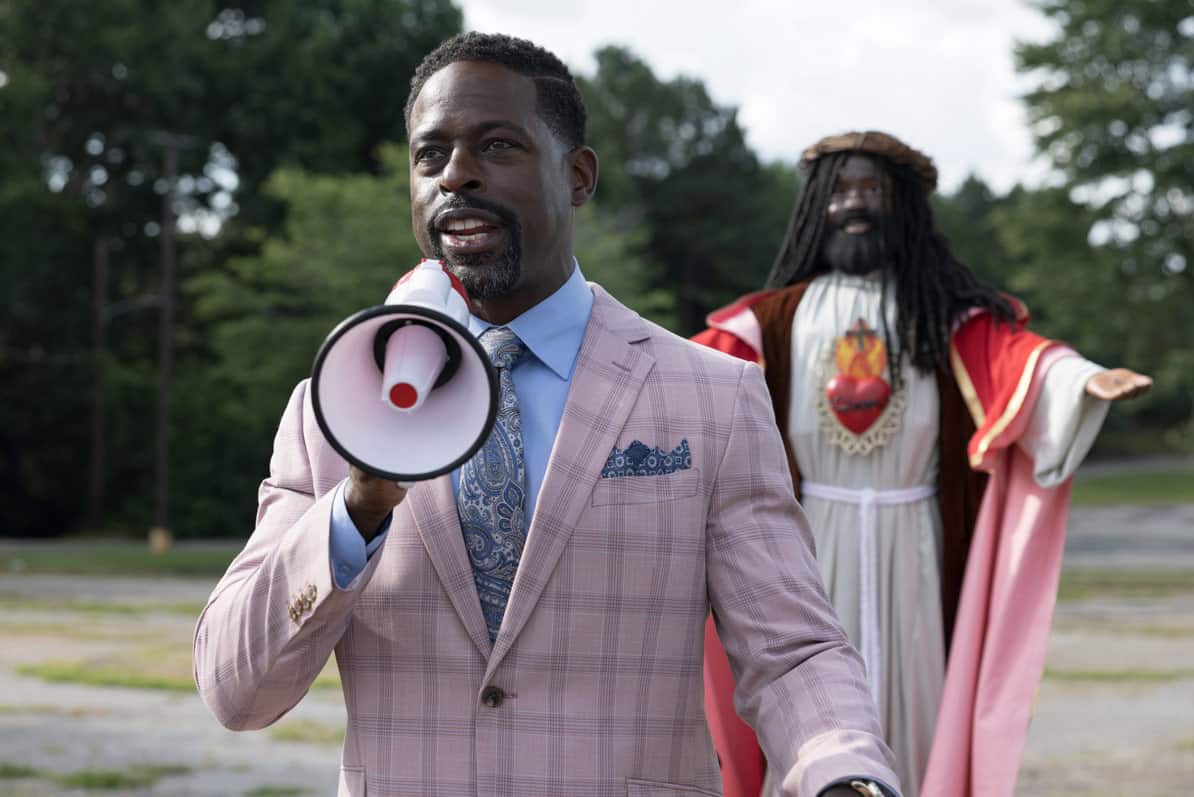Like the rest of Gen Z, I cannot remember a time in the church before the sexual abuse crisis of the early 2000s. Headlines about investigations, cover-ups, and settlements seemed as much a part of growing up Catholic as my first communion or confirmation. The same goes for the mountain of pop culture that has accumulated since. After the last twenty years of Louis C.K. routines and Family Guy episodes, one more comedy caricaturing sexual misconduct by church leadership at first seemed like nothing new. But Honk for Jesus, Save Your Soul is far from yet another irreverent lampoon—it is a biting satire that asks serious questions about accountability and forgiveness.
The film follows Pastor Lee-Curtis Childs (Sterling K. Brown) and his wife, First Lady Trinitee Childs (Regina Hall), as they attempt to reopen Wander to Greater Paths Baptist Church. The church that once boasted a booming congregation closed its doors several years before, after multiple allegations of sexual misconduct against Pastor Lee-Curtis forced him to step back from ministry. The film follows them in the weeks leading up to the grand reopening, and expected comeback, set for Easter Sunday.
As the day approaches, the Childs search for outfits in closets full of designer clothes, attempt to woo former parishioners, and size up their competition—an evangelical church set to open a brand-new campus. The ensuing drama leaves plenty of space for laughs, with tons of pointed one-liners and more than one perfectly petty use of “have a blessed day.” Even so, the wisecracking did little to offset the film’s serious subject matter. The weight of Pastor Lee Curtis’s actions set in and the crowd at the sold-out matinee where I saw the film fell uncomfortably silent.
The past that the Childs are so eager to cover up and leave behind is not easily forgotten. The exact nature of the allegations against the pastor never come to light. Only speculation on local radio shows, gossipy exchanges between parishioners, and furtive conversations about settlement costs offer glimpses of what took place. Glaringly absent is any measure of accountability for Pastor Lee Curtis. Everything is surrounded by secrets and oblique allusion. Even in moments of fiery confrontation characters stop short of facing up to the truth, of naming his abusive behavior for what it is.
No one is more avoidant than Lee Curtis himself. As he rehearses his first sermon in a darkened church, he calls himself a sinner, but in the general way that everyone else is. His absolution apparently comes because he is no different than his parishioners out in the pews. There is no seeking forgiveness and certainly no apology. His tone is triumphant, his voice booming with an underdog’s attitude. Less than a sermon, it is a non-apology that is lamentably all too predictable coming from the mouth of a high-powered clergyman. The satirical writing here reaches the point where it is hardly distinguishable from the statements it satirizes. As I listened, I did my best to remember particularly compelling instances of contrition from leadership in the Catholic Church. Tellingly, none came to mind.
Listening from the first row, the first lady shared my skepticism. She pushed back on a sermon that felt impersonal and unfeeling, but stops short of saying why, of challenging her husband with the reality of his transgressions. In this moment it becomes obvious that Trinitee has carried the burden of navigating her husband’s mess from the beginning. She is caught between survival and scandal, attempting to salvage some piece of the empire they built together while enduring severe scrutiny from her family and community. As first lady, Trinitee faces an intensely personal version of the same dichotomy that everyone at Wander to Greater Paths faces—to walk away or to pretend like nothing happened. There are apparently no other options.
With little hope for accountability from within the church, an outside perspective on the scandal is offered by a camera crew and unseen director that offer a mockumentary-style framing for the film, though it becomes less and less clear who they are making the film for. Throughout most of the film the director, Anita, is silent. Only when questioned directly about why she has decided to make the film at all does she speak up, and her answers are unconvincing and vague. She is curious about “the culture” and wants to know “the truth.” Her investigation, it seems, is less about exposing abusive behavior and more about exploiting the drama on full display. There is a quiet, nuanced satire at work here, picking apart the culture of voyeuristic documentaries made by filmmakers with little commitment to the communities they portray.
If after watching Honk for Jesus we in the audience feel that the film leaves too much unresolved, it is because there is still too much unresolved surrounding accountability for sexual abuse in our own communities. While we may never personally encounter the hard reality that Trinitee Childs is forced to confront, we know that it is all too possible. We already know how these things usually end, not with restorative justice and the possibility for reconciliation, but with quiet payouts and a shattered community.
It would be convenient for a white churchgoing audience to take an outsider’s perspective here: watching from a distance, quick to condemn the emptiness of the prosperity gospel that Pastor Lee-Childs preaches, dismissing his failings as indicative of problems particular to the Black evangelical church. In reality, there are no churches, no matter their theology or membership, immune to the sort of scandal that Honk for Jesus shows. There are many more churches that give in to clericalism and patriarchy, that excuse or ignore abusive behavior, that neglect to care for the most vulnerable in their midst. There are many more churches where God is treated as simply a stepping stone for the man in charge to get what he wants.
In Honk for Jesus, it seems no one prays without performance, without standing on a stage, without a spotlight and a whole lot to say for themselves. After one particularly passionate praise break, a teenage congregant confides to the camera that she does drama at school. In that same service, standing knee deep in the baptismal font, the pastor and the first lady argue about which pronunciation of the word amen is more popular with the younger crowd. A satisfied self-reliance seems to have completely taken the place of trust in God. As Pastor Childs shouts in a moment of fierce intensity, “I saved myself!” It is obvious that nothing could be further from the truth.
-//-
Watch the movie in theaters and on Peacock. Image courtesy of Focus Features.


